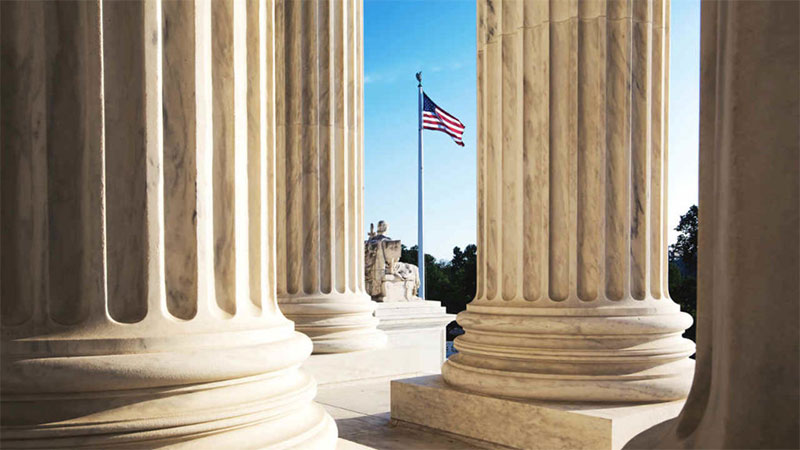
Like ships passing in the night, Congress left Washington, D.C. to go back home while the Supreme Court Justices gathered to begin their Fall term. This term, the Court will hear oral arguments on cases regarding free speech, elections, affirmative action, big tech, and more. Here are some notable cases to watch:
Moore v. Harper
This year’s redistricting efforts came under scrutiny in many states. North Carolina’s state Supreme Court ruled that the Republican-drawn congressional maps were “unconstitutional beyond a reasonable doubt under the free elections clause, the equal protection clause, the free speech clause, and the freedom of assembly clause of the North Carolina Constitution” due to partisan gerrymandering. Currently, However, GOP lawmakers are citing the Constitution’s Election Clause that allows states to determine how federal elections proceed in their state.
If the Supreme Court sides with Republicans, legislatures would no longer be subject to review by their state Supreme Courts on Congressional redistricting.
Merrill v. Milligan
Like Moore v. Harper, the Supreme Court will decide if Alabama’s congressional maps are constitutional, but the issue in this case is whether the districts, as drawn, violate Section 2 of the Voting Rights Act by discriminating on the basis of race. The lawsuit claims that only one district has a majority of black voters while the rest are spread out throughout other districts which do not allow them to have a voice in electing their representative. The state has defended the Republican-drawn map, saying that it is taking a “race-neutral” approach to redistricting and it is asking the court to overturn a lower court decision.
The Supreme Court will decide whether states need to take race into consideration while drawing these maps. If the Court sides with Alabama, it would be a win for states’ rights. Based on Tuesday’s hearing, it seems that the Justices are leaning this way. The Supreme Court earlier decided to allow the congressional map to stand for the 2022 elections.
Students for Fair Admissions v. Harvard College & Students for Fair Admissions v. University of North Carolina
The organization Students for Fair Admissions, a group of Asian Americans, is suing two colleges based on their alleged discrimination against Asian American and white students. Recently, many schools have changed their admissions processes to use race as a determining factor rather than a contextual factor. In doing so, colleges have overlooked Asian and white populations to appease the current political climate on race.
The Supreme Court will hear both cases on October 31st and its decisions will clarify the role of race in college admissions.
303 Creative LLC v. Elenis
In 2018, the Supreme Court narrowly decided in favor of Jack Phillips, a Colorado cake baker who refused to bake a custom cake for a same-sex wedding. In that case, the Court said the Colorado administrative agency was hostile to his religious beliefs but it did not rule on whether requiring him to provide his services was a violation of his free speech rights. Now the Court will hear another case from Colorado on the intersection of religious beliefs and LGBTQ rights.
Lorie Smith owns the graphic design firm 303 Creative and wants to expand her business to include wedding websites. Because she opposes same-sex marriage on religious grounds, Smith does not want to design websites for same-sex weddings, and she wants to post a message on her own website to explain that. But a Colorado law prohibits businesses that are open to the public from discriminating against gay people or announcing their intent to do so.
Smith went to federal court, seeking a ruling that Colorado could not enforce its anti-discrimination law against her. The U.S. Court of Appeals for the 10th Circuit agreed that Smith’s “creation of wedding websites is pure speech,” and that Colorado law compels Smith to create a speech that she would otherwise refuse. But the Court of Appeals concluded that the anti-discrimination law does not violate the Constitution in this case because the law is narrowly tailored to the state’s interest in ensuring that LGBTQ customers have access to the unique services that Smith provides.
The justices agreed to take up Smith’s claim under the free speech clause of the First Amendment, but will not consider whether her free exercise right are being violated. The case will still be a major ruling because it may clarify when business owners who are engaged in expressive activities are entitled to religious-based exemptions from laws protecting civil rights.[1]
Gonzalez v. Google & Twitter v. Taamneh
The Supreme Court is looking into a pair of cases that address social media liability. Google, Twitter, and Facebook are accused of promoting terroristic activity on their platforms which contributed to the coordinated ISIS attacks in Paris in 2015 and a 2017 shooting in an Istanbul nightclub. Section 230 of the 1996 Communications Decency Act provides immunity to these platforms for the content that is shared on their websites. Although the platforms are not the original publishers of the content, they create the algorithms that push it forward. This ruling will clarify the role of social media companies in regard to publishing and censorship.
After an intense Spring term for the Supreme Court, we hope that the left’s ongoing violence in word and deed has not influenced their decisions going forward. Eagle Forum encourages the conservative justices to defend our Constitutional freedoms as they were originally intended by our Founders.
[1] https://www.scotusblog.com/2022/02/justices-will-hear-free-speech-claim-from-website-designer-who-opposes-same-sex-marriage/
















